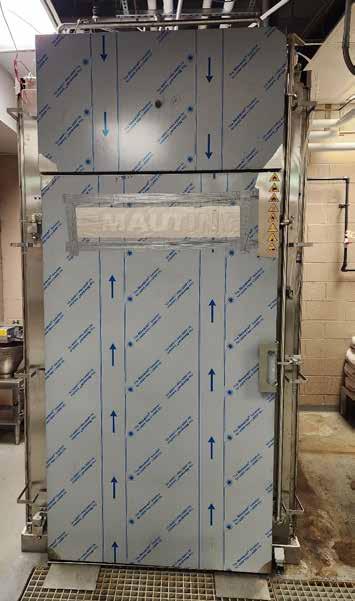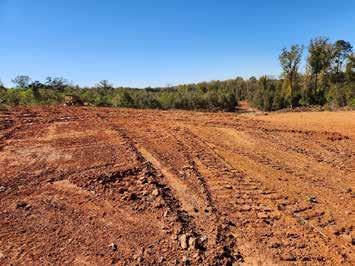
6 minute read
Department of Animal and Dairy Science: Beef Update By Francis Fluharty, Professor and Department Head, University of Georgia

DEPARTMENT OF ANIMAL AND DAIRY SCIENCE: BEEF UPDATE
Advertisement
By Francis Fluharty, Professor and Department Head
It’s all about culture. Academic departments at universities are very similar to any successful business. Success relies on having a culture that promotes teamwork and creative problem solving, hiring and retaining the best people, and being a destination workplace (or school). Yes, we have to attract the best students, too, because we’re in the business of creating future leaders. Conducting high-quality research requires state-of-the-art equipment and facilities, too. From the road, most of our farms look like other farms. They have fences and working facilities. However, when you look more closely, you can see fields divided into sections with animals enclosed in smaller grazing areas in a larger field. We split animals into groups, which are called experimental units, so that we can analyze the results of our studies using statistics. It’s all done in the name of getting scientifically valid information for our recommendations to producers. Over the past year, we have placed a tremendous amount of effort, time and money into upgrading our facilities. The success of the beef industry of the future relies on identifying those genetics, nutritional programs, reproduction technologies, and management systems that enhance the reproductive efficiency of our cow herds, improve the efficiency of feed and water utilization for production, which will also reduce greenhouse gas emissions, and improve the consistency of a high-quality protein source that is desired by consumers.
Faculty in the Department want to address the issues of individual animal feed and water intake, and greenhouse gas emissions. Thanks to a grant from the Georgia Commodity Commission for Beef, C-Lock feed and water intake measuring equipment was ordered on Nov. 9, 2021. Covid-19 caused a delay in the
delivery of equipment, but most has arrived and is being installed. The Double Bridges Farm in Athens (facing page) is being set up for feed and water intake, and greenhouse gas emissions, and the Eatonton beef feedlot is being set up for feed intake monitoring. In addition, Eatonton is receiving C-Lock systems that can measure individual animal supplementation in pasture situations. Our goal is to have the Double Bridges and Eatonton facilities operational by Feb. 1, 2023.
Our Meat Science and Technology Center in Athens has received quite a bit of attention this year. During this past summer, our flooring was completely removed and new epoxy flooring was installed. In addition, a new animal welfarecompliant knock box was installed, and our new smokehouse arrived in October. These upgrades to the Meat Science and Technology Center may not seem like a lot, but they cost over $600,000.
We’ve been doing a lot of land renovation and fencing at all the farms. Hiring more faculty and doing more research means needing to have more animals and more productive forage and crop land. Having a culture of taking pride in what we do also means doing things that make economic sense from a production standpoint. So, if you drive by one of our farms – such as Double Bridges in Athens – and see us clearing land that had been allowed to grow up in trees, it’s for a purpose. We are making our farms more productive.
We’re upgrading our cattle handling facilities at Alapaha and Tifton, too. As we transition to more beef research at these locations, we need facilities that are capable of having cattle worked frequently, as research requires weighting cattle at regular times, such as every 28 days, throughout growth studies, and reproductive technology studies, such as estrus synchronization, involve working breeding animals on timed intervals.


There are a lot of people that I could talk about, and I will in future articles. However, I want to focus on leadership development. I am a supporter of experiential learning opportunities, such as undergraduate research, study-abroad programs, and working on our farms and in our laboratories. I am also a supporter of Intercollegiate Judging Teams. Among the things that drew me to Georgia were the tremendous 4-H and FFA programs. We need to create opportunities to keep Georgia’s young people in Georgia. Many youth involved in Livestock, Meat, Dairy, and Horse judging attend junior colleges and universities with these programs. Building a culture that is supportive of these activities takes a lot of committed people – and a lot of money. However, the payback to these students is tremendous. Students who participate in Intercollegiate Judging Teams learn teamwork, time management, decision making, and communication skills. They also get to interact with industry leaders, and they develop a much greater appreciation for the size and scope of American agriculture. The #meatdawgs had a very successful trip to Friona, Texas, in late October, for the High Plains Intercollegiate Meat Judging Contest, where they were named the National Champion A Division Team! We want to say THANK YOU to Cargill and the American Meat Science Association for hosting a great contest and everyone who has supported us along the way.
I want everyone to know that when you read one of our research updates, attend a field day, or call a specialist for information, there is a lot of hard work that goes on behind the scenes that never gets mentioned. We run farms and a meat laboratory to train students and conduct research. We’re working to provide scientifically valid information for producers and consumers, and to prepare young people to be future leaders in animal agriculture and the animal protein industries.

GCA Members Receive $50 off a Cattle Industry Registration OR $20 off a Trade Show Only Registration Use Coupon Code: 23GEC
CATTLE INDUSTRY CONVENTION & NCBA TRADE SHOW FEBRUARY 1-3, 2023

FOLLOW US ON SOCIAL MEDIA #CattleCon23 CONVENTION.NCBA.ORG
TEXT BEEF TO 877-319-2142
Photo: p. 22: Facilities updates at UGA. The goal is to have the Double Bridges and Eatonton facilities operational by February 1, 2023. Photo: p. 23, top right: The Meat Science and Technology Center upgraded equipment with a new animal welfare-compliant knock box.
Photo: p. 23, bottom right: A new smokehouse was added to the Meat Science and Technology Center in October 2022. Photo: p. 24, above: Renovations and updates are taking place at the various farms to account for growth and new research being conducted.
NATIONAL HIGH PLAINS INTERCOLLEGIATE CHAMPIONS

Pictured Left to Right: Clint Lee, Cason Galloway, Anna Unger, Preston Nave, Levi Martin, and Coach Anna Scott
Champion Team Overall, High Team Overall Beef, High Team Beef Grading, High Team Lamb Judging, High Team Placings, 2nd High Team Beef Judging, 3rd High Team Questions, 4th High Team Pork Judging
Levi Martin: High Individual Overall, High Individual Overall Beef, High Individual Beef Grading, High Individual Questions, 2nd High Individual Beef Judging, 2nd High Individual Lamb Judging, First Team All-American Anna Unger: 7th High Individual Overall, 2nd High Individual Beef Grading, 2nd High Team All-American Cason Galloway: High Individual Placings Clint Lee: 2nd High Individual Placings Preston Nave: High Individual Alternate










